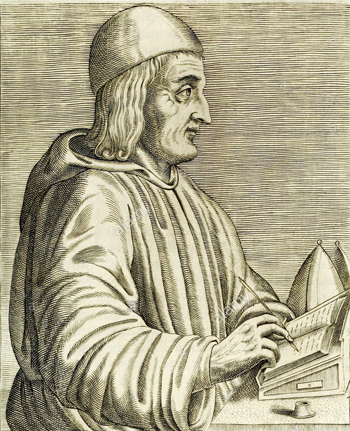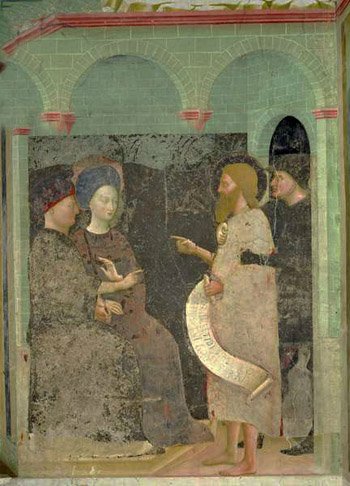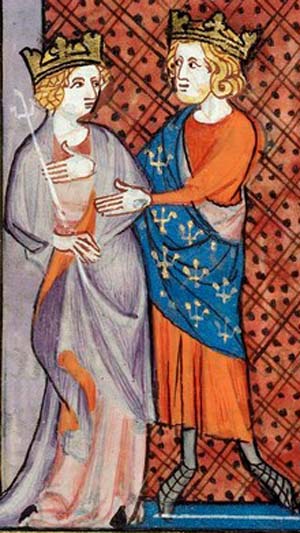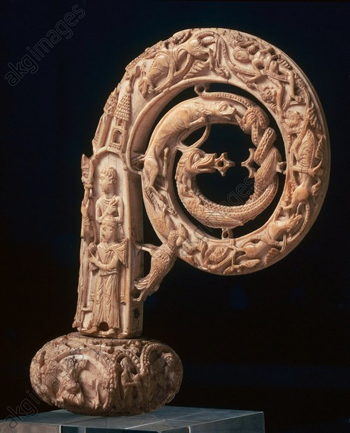The Saint of the Day
 |
 |
 |
 |
 |
 |
 |
St. Ivo of Chartres - May 23
Biographical selection:
In 1092 King Philip I of France repudiated his legitimate spouse Bertha of Holland in order to marry Bertrade of Anjou, the wife of one of his noble vassals, alleging that a tribunal of Bishops supported him in his new marriage.
 The King called on St. Ivo, Bishop of Chartres, to support his action, Ivo was famous for his knowledge of canon law, and it was Philip I who had named him for the See of Chartres.
The King called on St. Ivo, Bishop of Chartres, to support his action, Ivo was famous for his knowledge of canon law, and it was Philip I who had named him for the See of Chartres.
St. Ivo responded to the Sovereign with these words:
“The words I spoke personally to Your Serene Highness prior to your oath, I now take the liberty to write. I neither desire nor am I able to attend the celebration of your marriage. Even if a general Council were to decide its legitimacy, I would not do it. My conscience, which I must keep pure before God, and my reputation as Bishop prevent me from doing so. I would prefer to be thrown into the depths of the ocean with a stone tied to my neck than to be an object of scandal.”
When the King decided to go forward with the marriage, Pope Urban II named Archbishop Hugh of Lyon as his representative in France to condemn the Monarch. But Hugh feared to displease the King and numerous Bishops counseled him to refuse the mission. Then, St. Ivo wrote to the hesitant Hugh:
 “One who is in good health does not need physicians; they are needed by those who are ill. … Even though Herodias married Herod and asked for the head of St. John Baptist, it was necessary for John to say: ‘It is not licit for you to repudiate your wife and take a wife of another.’ … The more evil men struggle against the Church, the more necessary it is to have the courage to defend her and raise her from the ruins. I do not speak in this way to teach you, but to persuade you to take hold the plow to rip out the thorns from the field of the Lord.”
“One who is in good health does not need physicians; they are needed by those who are ill. … Even though Herodias married Herod and asked for the head of St. John Baptist, it was necessary for John to say: ‘It is not licit for you to repudiate your wife and take a wife of another.’ … The more evil men struggle against the Church, the more necessary it is to have the courage to defend her and raise her from the ruins. I do not speak in this way to teach you, but to persuade you to take hold the plow to rip out the thorns from the field of the Lord.”
The King was excommunicated and his marriage impeded. Then, he summoned St. Ivo to meet him and his ministers at Chaumont and at Pontoise. St. Ivo answered:
“Many reasons prevent me from obeying the order of Your Excellence. The first is that Pope Urban – by His Apostolic authority – forbade you to keep with you the woman you consider your wife. If you do not separate yourself from Bertrade, the same authority will forbid all the Bishops to crown this woman.
“Out of respect for Your Majesty I do not desire to approach you, fearing that to carry out the orders of the Holy See, to which I owe obedience as to Jesus Christ, I would be obliged to shout to the four winds what I now write to you in discretion.
“Another reason is that the majority of my vassals and soldiers are either absent or excommunicated. I cannot lift their excommunication until they have made due reparation, nor can I send them to combat while they are excommunicated.”
Comments of Prof. Plinio:
You see the problem here: The Church forbids divorce.
We are in the presence of a King of France who wants to divorce his wife and pseudo-marry another woman. The drama develops in the backdrop of the Catholic Church. The King tries to gain the support of the Bishops for his action. He looks for a tribunal to annul his marriage in order to legitimize the next marriage.
But he faces a valorous Bishop who refuses to participate in this tribunal and frustrates its purpose. The Pope is informed of the King’s intention and excommunicates him. The Pope orders a fearful Legate to apply the excommunication. This Legate receives the counsel from various fearful Bishops not to make the excommunication since it could bring temporal penalties against him.
In each of these moves, we see St. Ivo of Chartres intervening with great energy. He writes to the King refusing his approval for the marriage and frustrating the tribunal. He writes to the Legate counseling him to apply the excommunication made by the Pope. In the last move, the King summons him to come for a meeting with his ministers. The selection implies that it would be a meeting where the pseudo-queen would be crowned.
 He writes with diplomacy that, out of respect for the King, he does not wish to attend that meeting in order not to not take a public position against the King that his conscience would oblige him to take. He prefers to write rather than say it publicly. If the King forces him to attend, he will have to announce before everyone the moral situation of the King. The position of the Saint is so logical that it dispenses with the need for commentary. He did what he should do.
He writes with diplomacy that, out of respect for the King, he does not wish to attend that meeting in order not to not take a public position against the King that his conscience would oblige him to take. He prefers to write rather than say it publicly. If the King forces him to attend, he will have to announce before everyone the moral situation of the King. The position of the Saint is so logical that it dispenses with the need for commentary. He did what he should do.
What is the lesson this life teaches us?
It is to have two precious things before our eyes:
First, it is to have a logical spirit in our Faith. Once we admit the teachings of the Catholic Faith, we must live the Faith to its last consequences, even to martyrdom.
Logic is the natural order of the mind. The upright human intelligence finds its rest in logic, it is delighted by logic. Because of this, today an upright spirit feels a great malaise in our profoundly illogical society. Almost everything runs outside of the honest path, outside of duty and coherence. Persons have a type of voluptuous urge to enter into contradiction, to not accomplish their duties and to not take matters to their final consequences.
The liberal spirit, the spirit bitten by the Revolution, becomes angry at logic. Many persons become displeased when they face a logical reasoning.
How can this attitude be explained?
There are very few persons who have enough seriousness, elevation of soul and strength of will to look objectively at themselves even to the final consequences; to make a completely true judgment of themselves without complacency. That is, to see the evil foundation of human nature and see where their actions are leading, and then restrain themselves in the fundamental point of their vices.
By nature I have many defects, but they can be reduced to a single one, a monarchical point. So, I need to know my monarchical defect. Out of love of God, I have to know this defect. I need to know how to relate each one of my actions to this defect. I need to know the wild beast that is in me every time it moves in any direction.
This is not easy. It is one of the most difficult things that exist and it requires the help of grace. It is a super-human task that only can be achieved with the help of grace.
Now then, since the great majority of persons do not face their defects – running from facing them head on – when they hear a logical reasoning it often raises problems of conscience that they do not want to face. The lack of popularity of logic comes from this refusal to face one’s defects.
 We should love logic as St. Ivo of Chartres did. He had a logical spirit and we should be delighted to see someone who is logical like this. If we do not like it, it is because we are deceiving ourselves in some point.
We should love logic as St. Ivo of Chartres did. He had a logical spirit and we should be delighted to see someone who is logical like this. If we do not like it, it is because we are deceiving ourselves in some point.
If this happens, we should ask Our Lady for the grace to see ourselves to the very foundation of our souls.
Second, another thing that pleases is to see this logic in a Bishop. No other office in the world asks for more logic than that of the Bishop. He is the master, the doctor, the shepherd of his sheep; he was invested by God with the power to teach and sanctify his flock. Now, all these things must be done in truth, coherence and, therefore, logic.
How tormenting it is for us to see Bishops who are illogical, Bishops who are fearful! What malaise these things cause to our souls!
What a relief to see the true light shine in the candelabra: to see in the office of a Bishop a truly logical man! This makes us feels something of the beauty of the Church. And since the beauty of the Church is the greatest beauty of the universe, we should, and especially in our epoch, be avid collectors of these drops of beauty and admire them.


The Saint of the Day features highlights from the lives of saints based on comments made by the late Prof. Plinio Corrêa de Oliveira. Following the example of St. John Bosco who used to make similar talks for the boys of his College, each evening it was Prof. Plinio’s custom to make a short commentary on the lives of the next day’s saint in a meeting for youth in order to encourage them in the practice of virtue and love for the Catholic Church. TIA thought that its readers could profit from these valuable commentaries.
The texts of both the biographical data and the comments come from personal notes taken by Atila S. Guimarães from 1964 to 1995. Given the fact that the source is a personal notebook, it is possible that at times the biographic notes transcribed here will not rigorously follow the original text read by Prof. Plinio. The commentaries have also been adapted and translated for TIA’s site.
In 1092 King Philip I of France repudiated his legitimate spouse Bertha of Holland in order to marry Bertrade of Anjou, the wife of one of his noble vassals, alleging that a tribunal of Bishops supported him in his new marriage.

St. Ivo of Chartres
St. Ivo responded to the Sovereign with these words:
“The words I spoke personally to Your Serene Highness prior to your oath, I now take the liberty to write. I neither desire nor am I able to attend the celebration of your marriage. Even if a general Council were to decide its legitimacy, I would not do it. My conscience, which I must keep pure before God, and my reputation as Bishop prevent me from doing so. I would prefer to be thrown into the depths of the ocean with a stone tied to my neck than to be an object of scandal.”
When the King decided to go forward with the marriage, Pope Urban II named Archbishop Hugh of Lyon as his representative in France to condemn the Monarch. But Hugh feared to displease the King and numerous Bishops counseled him to refuse the mission. Then, St. Ivo wrote to the hesitant Hugh:

St. Ivo compared the King’s adultery to that of
Herod & Herodias, above
The King was excommunicated and his marriage impeded. Then, he summoned St. Ivo to meet him and his ministers at Chaumont and at Pontoise. St. Ivo answered:
“Many reasons prevent me from obeying the order of Your Excellence. The first is that Pope Urban – by His Apostolic authority – forbade you to keep with you the woman you consider your wife. If you do not separate yourself from Bertrade, the same authority will forbid all the Bishops to crown this woman.
“Out of respect for Your Majesty I do not desire to approach you, fearing that to carry out the orders of the Holy See, to which I owe obedience as to Jesus Christ, I would be obliged to shout to the four winds what I now write to you in discretion.
“Another reason is that the majority of my vassals and soldiers are either absent or excommunicated. I cannot lift their excommunication until they have made due reparation, nor can I send them to combat while they are excommunicated.”
Comments of Prof. Plinio:
You see the problem here: The Church forbids divorce.
We are in the presence of a King of France who wants to divorce his wife and pseudo-marry another woman. The drama develops in the backdrop of the Catholic Church. The King tries to gain the support of the Bishops for his action. He looks for a tribunal to annul his marriage in order to legitimize the next marriage.
But he faces a valorous Bishop who refuses to participate in this tribunal and frustrates its purpose. The Pope is informed of the King’s intention and excommunicates him. The Pope orders a fearful Legate to apply the excommunication. This Legate receives the counsel from various fearful Bishops not to make the excommunication since it could bring temporal penalties against him.
In each of these moves, we see St. Ivo of Chartres intervening with great energy. He writes to the King refusing his approval for the marriage and frustrating the tribunal. He writes to the Legate counseling him to apply the excommunication made by the Pope. In the last move, the King summons him to come for a meeting with his ministers. The selection implies that it would be a meeting where the pseudo-queen would be crowned.

King Philip I of France with his lover
Bertrade of Anjou
What is the lesson this life teaches us?
It is to have two precious things before our eyes:
First, it is to have a logical spirit in our Faith. Once we admit the teachings of the Catholic Faith, we must live the Faith to its last consequences, even to martyrdom.
Logic is the natural order of the mind. The upright human intelligence finds its rest in logic, it is delighted by logic. Because of this, today an upright spirit feels a great malaise in our profoundly illogical society. Almost everything runs outside of the honest path, outside of duty and coherence. Persons have a type of voluptuous urge to enter into contradiction, to not accomplish their duties and to not take matters to their final consequences.
The liberal spirit, the spirit bitten by the Revolution, becomes angry at logic. Many persons become displeased when they face a logical reasoning.
How can this attitude be explained?
There are very few persons who have enough seriousness, elevation of soul and strength of will to look objectively at themselves even to the final consequences; to make a completely true judgment of themselves without complacency. That is, to see the evil foundation of human nature and see where their actions are leading, and then restrain themselves in the fundamental point of their vices.
By nature I have many defects, but they can be reduced to a single one, a monarchical point. So, I need to know my monarchical defect. Out of love of God, I have to know this defect. I need to know how to relate each one of my actions to this defect. I need to know the wild beast that is in me every time it moves in any direction.
This is not easy. It is one of the most difficult things that exist and it requires the help of grace. It is a super-human task that only can be achieved with the help of grace.
Now then, since the great majority of persons do not face their defects – running from facing them head on – when they hear a logical reasoning it often raises problems of conscience that they do not want to face. The lack of popularity of logic comes from this refusal to face one’s defects.

St. Ivo of Chartres’ ivory crosier
If this happens, we should ask Our Lady for the grace to see ourselves to the very foundation of our souls.
Second, another thing that pleases is to see this logic in a Bishop. No other office in the world asks for more logic than that of the Bishop. He is the master, the doctor, the shepherd of his sheep; he was invested by God with the power to teach and sanctify his flock. Now, all these things must be done in truth, coherence and, therefore, logic.
How tormenting it is for us to see Bishops who are illogical, Bishops who are fearful! What malaise these things cause to our souls!
What a relief to see the true light shine in the candelabra: to see in the office of a Bishop a truly logical man! This makes us feels something of the beauty of the Church. And since the beauty of the Church is the greatest beauty of the universe, we should, and especially in our epoch, be avid collectors of these drops of beauty and admire them.

 | |
|
|
The texts of both the biographical data and the comments come from personal notes taken by Atila S. Guimarães from 1964 to 1995. Given the fact that the source is a personal notebook, it is possible that at times the biographic notes transcribed here will not rigorously follow the original text read by Prof. Plinio. The commentaries have also been adapted and translated for TIA’s site.


